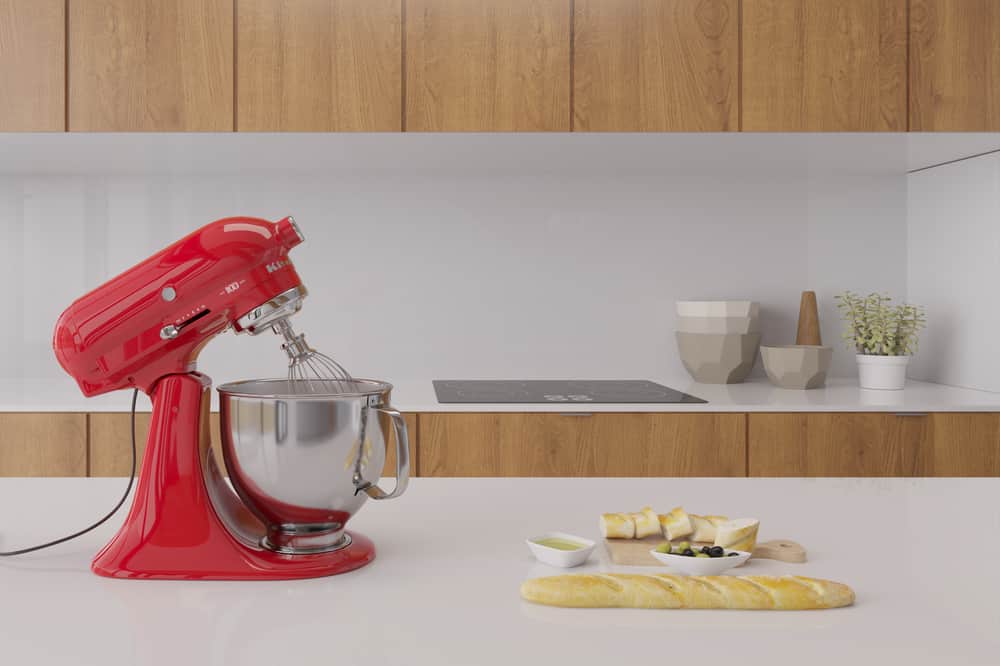
The kitchens need proper electrical appliances to ensure the kitchen work is streamlined at all times. One such kitchen appliance is a mixer, which can quicken up the cooking experience if you have to shake up the ingredients or simply make some delicious smoothies. However, the performance usually depends on the brand, and KitchenAid is a perfect option for people who want a reliable mixer. Still, there are times when people ask, “why is my KitchenAid mixer so loud?” In case you are in the same boat, we are sharing some solutions with you!
Why Is My KitchenAid Mixer So Loud?
1. Failed Worm Gear
When your mixer starts making loud noises, and it’s mostly during grinding, the most potential reason is the worm gear. For those who don’t know, the worm gear is defined as a plastic gear that’s meant to fail when something is not right within the mixer. It is integrated into the mixer to ensure the motor doesn’t fail or burn out. For this reason, when the worm gear stops working, it will result in loud noises while you grind your food. While it is possible to replace the worm gear, it is better that you call your technician to resolve the issue. In fact, if your KitchenAid mixer is still in warranty, don’t forget to get a free repair or replacement by calling customer support.
2. Old Grease
When it comes down to the KitchenAid mixers, they are designed with high-tech gear, which needs to be properly greased to ensure the machine keeps working. In the course of years, the mixer will start losing shape, and the quality of gear will notch down. In addition, grease is essential to streamline the spinning of blades and other components of the mixer. That being said, if the mixer doesn’t have proper greasing, it is likely to result in loud noises. To illustrate, there will be rattling noise if there is no grease. Having said that, you have to open up the KitchenAid mixer and clean the old grease. Once the old grease is out, apply new grease but make sure it’s not dripping.
3. Speed
If you have ruled out the grease and worm gear issue, another reason could be speed. In particular, if you are using the older models of the mixers, they won’t be able to handle high speed. So, if you are operating your mixer at extremely high speed, it could be the reason behind loud noise. This is because, at high speed, the motor needs to work hard, resulting in loud noise. For this reason, it is suggested that you cut down the speed of the mixer and see if it reduces the noise.
4. Ingredients
In various cases, there is nothing wrong with the KitchenAid mixer because some ingredients can be pretty noisy. For instance, if you are grinding the hard ingredients, including peppercorns, it will result in excessive movement, resulting in loud noise. To be precise, these ingredients simply bounce in the plastic jug or container of the mixer, which will create noise. So, if you are blending such ingredients, just stop blaming your mixer.
5. Brushed Motors
If you are using the KitchenAid mixer model with a brushed motor, it could be a reason behind loud noise. This is because the brushed motor is designed to produce rotational movements, and it includes magnets. Having said that, the magnet has a higher polarity, which means the motor has to work harder to grind the ingredients, which will result in a loud noise. To summarize, there is nothing you can do if your mixer is integrated with a brushed motor.
6. Components
While there are no compromises on quality with the KitchenAid mixer, if you have recently replaced some components in the mixer, there are chances that you used the low-quality components. For the most part, the cheap components have higher chances of making more noise, including poor connection and absence of lubricant in the high-stress parts of the mixer. That being said, get the mixer checked and make sure there are no low-quality components in the mixer!
7. Tips To Reduce The Noise
If there is nothing that you can do for fixing the loud noise, you can follow some tips to reduce the noise, such as;
- Use the sound dampening mat for placing your grinder
- Apply some rubber feet for dampening the noise
- Purchase a soundproof box for the mixer